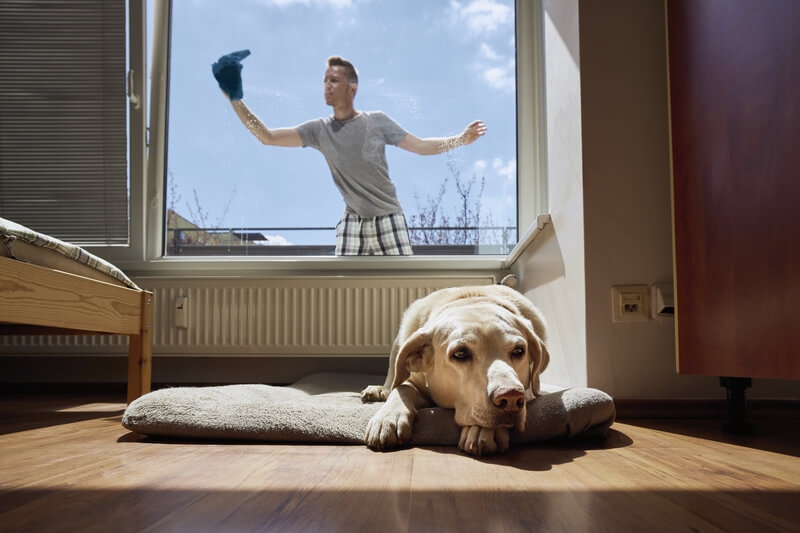If you’re a landlord, allowing pets in your rental unit can be a difficult decision. While it’s true that pets can provide companionship and comfort to tenants, they can also cause damage and create additional responsibilities for landlords. This decision ultimately depends on your personal preferences and circumstances, as well as your ability to effectively manage potential risks.
If you’re considering allowing pets in your rental property, it’s important to keep in mind that a one-time pet deposit is just the first step. To ensure responsible pet ownership and the upkeep of your property, a Pet Maintenance Agreement is a crucial component. Should you need more information on this important matter, feel free to reach out.
In this article, we will look at the pros and cons of allowing tenants to have pets.
Pros of Allowing Tenants to Have Pets
Reduced Tenant Rotation
Keeping tenants for extended periods means retaining more of your rental income, as turnovers often incur significant costs. Pet owners tend to stay longer since finding pet-friendly rentals can be challenging. Pets contribute to stress reduction, leading to happier and more content tenants. Allowing pets decreases the chances of tenants sneaking unauthorized pets into your property. Additionally, pets like dogs can offer added security to your premises.
An Expanded Pool of Potential Tenants
Allowing pets in your rental unit means that you are opening up your property to a larger pool of potential renters. Many people own pets, and for those who do, finding a rental property that allows pets can be challenging. By allowing pets, you may attract tenants who are otherwise not able to find suitable accommodation.
Higher Rent
Allowing pets may also allow you to charge higher rent. Tenants with pets are often willing to pay a premium for pet-friendly accommodation, as they understand that it can be difficult to find.
Longer Tenancy
Tenants with pets are often more likely to stay in a rental unit for a longer period. This is because it can be difficult to find pet-friendly accommodation, and once they have found a suitable place, they are less likely to move on.
Responsible Tenants
Many pet owners are responsible and respectful tenants because they have experience in caring for another living being, which requires responsibility and dedication. This experience often translates to their attitude towards their living space, as they understand the importance of maintaining a clean and safe environment for themselves and their pets.
Cons of Allowing Tenants to Have Pets
Property Damage
One of the biggest concerns with allowing pets in a rental unit is the potential for property damage. Pets can scratch floors, urinate on carpets, chew on wires and furniture, and cause other types of damage that can be costly to repair.
Noise Complaints
Depending on the type of pet, there may be noise complaints from other tenants or neighbors. Barking dogs, meowing cats, and squawking birds can all be disruptive and may cause tension between tenants.
Liability
Allowing pets in your rental unit may increase your liability as a landlord. While tenants’ insurance may cover some incidents involving pets, it’s important to keep in mind that as a landlord, you could still be held liable for any damages or injuries caused by a tenant’s pet. Although such cases are rare, it’s still a possibility to consider. For example, a dog bite can result in substantial medical bills and even legal action against the landlord. As such, it’s important to fully understand the potential liability risks before deciding whether to allow pets in your rental unit.
Cleaning Costs
Pets can also create additional cleaning costs, as they can shed hair and leave behind odors and stains. This can be particularly problematic if the next tenant has allergies or is sensitive to pet odors.
Odors
Neglected litter boxes and pet accidents in common areas can lead to unpleasant smells lingering. Additionally, pets that are not groomed regularly or adequately can contribute to undesirable odors within the unit.
Allergens
It might seem insignificant if neither you nor your current tenants have pet allergies. However, allergens have a tendency to seep into carpets and air ducts, persisting for extended periods. Consequently, if your potential future tenants are allergic to pets, they are likely to experience allergic reactions while inside your property. This could prompt them to vacate your rental or opt against choosing it altogether.
What Should I Do?
While allowing pets in your rental can attract a larger pool of potential tenants and result in higher rent and longer tenancy, it also comes with the risk of property damage, noise complaints, liability, and cleaning costs. If you do decide to allow pets, it is important to have a clear pet policy in place and to screen potential tenants carefully to ensure that they are responsible pet owners.
Every choice concerning your rental property holds significance. Determining whether to permit pets can pose a challenge, but understanding the advantages and disadvantages can simplify the decision-making process.
You will have to weigh the pros and cons of allowing tenants to have pets on your property. You can adjust your policy before a new tenant takes occupancy.
Our GIL Property Management team is ready to assist you with rental property management and complex decisions. Contact us today at (403) 266-3550.


